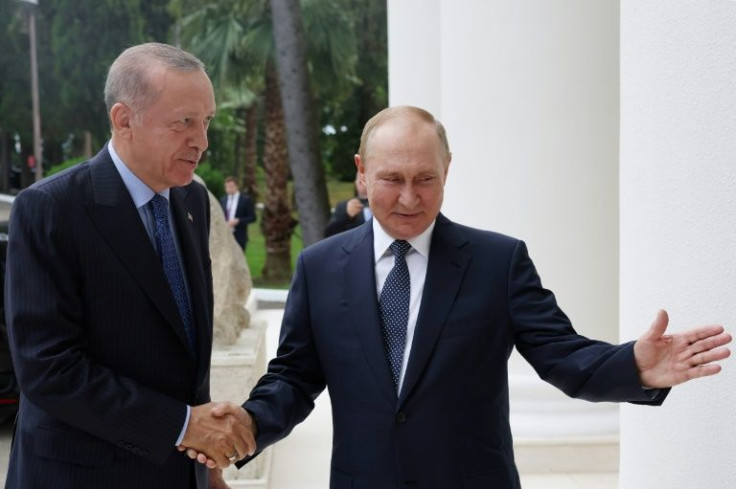Putin Falls For Black Sea Over Baltic Sea, Selects Turkey As Next Launchpad

The choice before Russian President Vladimir Putin is the Black Sea, under the stewardship of ally Turkey, or the Baltic Sea, lorded over by eight EU nations, led by Germany.
When Nord Stream 1 in the Baltic Sea, which was supplying gas to the European Union from Russia until Moscow cut off supplies at August-end, and the Nord Stream 2 pipeline again meant for supplying gas to Europe and which never entered service as Germany suspended its certification due to the Ukraine war, were damaged due to explosions in September-end, Putin decided to shift his attention to the Black Sea
from the Baltic Sea.
The governments of Denmark and Sweden termed the explosions in the Baltic Sea a deliberate act of sabotage and Germany started a probe. While Putin accused the West of attacking the pipelines, the U.S. and its allies vehemently denied it.
With the explosions in the Baltic Sea, Putin got the message clear and found the Black Sea and its leading nation, Turkey, more attractive and safe.
As members of the European Union, the largest trade block in the world, eight Baltic Sea nations are determined to neutralize Russia's main source of geopolitical leverage over Europe with its much-coveted energy and oil.
Besides, all of them -- Germany, Poland, Lithuania, Latvia, Estonia, Finland, Sweden, and Denmark -- have decided to increase their energy cooperation.
Eight of them held the Baltic Sea Energy Security Summit in Denmark on Aug. 30 to prevent Russia from using its energy as a political and economic weapon via the Baltic Sea.
In contrast, the Black Sea has got much less attention and energy from Russia is already flowing smoothly via the TurkStream pipeline on the Black Sea.
With Bulgaria, Romania and Turkey as members, the 27-member European Union directly borders the Black Sea, accounting for half of its coastline in the southeastern extremity of Europe.
In fact, Romania and Bulgaria are importing crude through terminals on their Black Sea
coasts.
Besides helping Turkey to meet its energy demand, TurkStream, connecting the largest gas reserves in Russia to Turkey via the Black Sea, can help Ankara exploit its geopolitical position by becoming a major energy hub between the East and the West.
The Black sea already serves as a barrier for NATO to counter Russia. Putin has another special reason to fall for the Black Sea over the Baltic Sea.
The Black Sea region not only serves as a frontier between the West and Russia, but also acts as the melting point of great forces like a high concentration of Russian and Turkish interests, growing Chinese influence in the east, and Middle Eastern instability in the south.
Since the U.S. does not prioritize the Black Sea region, Turkey does not occupy a prime slot in the U.S. scheme of things. So, Putin can fall back on Turkey, a NATO member, at any time.
A lack of U.S. commitment left Turkey vulnerable and it came closer to its powerful northern neighbor Russia.
Interestingly, there is already a boom in wartime trade between them. Turkey is paying for its Russian natural gas imports in rubles under a new set of trade deals.
Despite being a NATO member, Turkey has refused to slap sanctions on Russia over its invasion of Ukraine. Both Russia and Turkey have buried their differences over Syria and Libya.
Before inching closer to Russia, Turkey had been sitting on two chairs, doing business with Russia and accommodating the U.S. on a case-by-case basis, according to the situation.
So far, Turkey has managed to pull it off by and large.
Now, Putin wants to reciprocate Turkey's goodwill gestures during wartime. On Oct. 13, Putin suggested making Turkey a gas hub.
"Turkey has turned out to be the most reliable route for deliveries today, even to Europe," the Russian leader told Recep Tayyip Erdoğan at a face-to-face meeting in the capital of Kazakhstan.
"We could move the lost volumes from the Nord Streams along the bottom of the Baltic Sea to the Black Sea region," Putin reminded Erdogan.
Alexei Miller, the CEO of state-owned Gazprom, also echoed similar views.
Turkey was caught napping at the proposal, suggested by Putin on the sidelines of the Conference on Interaction and Confidence Building Measures in Asia (CICA) in Astana.
"It is the first time we've heard this. Thus it is early to make an assessment," Turkish Energy Minister Fatih Donmez said.
Apart from being the world's biggest natural gas exporter, Russia is the second largest oil exporter after Saudi Arabia. Putin does not want to cede its leading position just because of the U.S.-led sanctions.
Putin has selected the Black Sea -- lying between Europe and Asia -- and Turkey as the next launch pad.
























